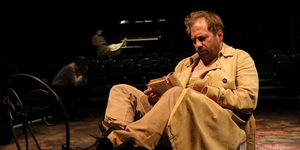Review: IVANOV at Grand Théâtre
This week we had the pleasure of covering Anton Chekhov's Ivanov.

This week we had the pleasure of covering Anton Chekhov's Ivanov. This timeless classic was directed by Myriam Muller and presented at the Grand Théâtre for four consecutive nights. It was interesting to see familiar faces returning to the stage, even more so considering that just a couple of months ago we were watching them perform in a different language. The more we get to know Luxembourg and its art scene, the more surprised we get at not only the quality of the shows available, but also the capacity they have to embody the country's diversity and cultural flexibility.
For those unfamiliar with Chekhov's work, the play tells the story of Ivanov (Jules Werner), a depressed government official who finds himself in a state of misunderstood lethargy. The narrative invites the audience to multiple takes on Ivanov's condition, playing with concepts like laziness and infidelity, but we are ultimately confronted with the sad reality of a man who has simply lost the ability to find meaning in his life. Those in his close circle never truly grasp what is wrong with our middle-aged protagonist - not his sick wife Anna (Sophie Mousel), nor his friend Borkine (Pitt Simon) and certainly not his clueless relative, the count Chabelski (Denis Jousselin). At the beginning of the play, Ivanov's estate seems to be in significant disarray, but nothing worsens Anna's feeble medical condition as much as her husband's behaviour.
Despite Doctor Lvov's (Mathieu Besnard) constant warnings, Ivanov does not find the will to change. Their marriage suffers yet another blow, when he attends a party at Lébédev's house (Valéry Plancke) and ends up kissing his daughter, Sasha (Manon Raffaelli). Anna unexpectedly shows up at the event and witnesses the kiss, opening the door do a downward spiral that ultimately results in tragedy.
The gold: Sophie Mousel and Jules Werner. We have to split the trophy this time, since it is their joint performance that takes the prize. There was nothing but praise for Werner in our review of Dealing with Clair and once again the actor excels in a completely different role. The slow pace imposed by the character's depressive state is never dull or tiresome and there is always a genuine fluidity between the multiple moments of smothering depression, the instances of desperate rage and the failed attempts to raise one's head above the sand. All his actions fit quite organically with Anna's unwilling downfall, as every exchange takes her closer to an end that is, at every step, linked to her relationship with her husband. We remember Mousel's solid performance in Marivaux's A Game of Love and Chance, yet this role seemed to truly bring out all her strengths. Her multiple shades of pain and misery add an unspeakable depth to the play, one that is not only profound, but also touchingly relatable. If you play close attention, you notice how well the two actors establish the atmosphere of their marriage - Ivanov displays such little physical and emotional interest in his wife, that you almost forget that the poor woman is being played by a stunning actress. Anna's death is truly well crafted and, despite being surrounded by sadness, Mousel still makes it feel immensely liberating.
The silver: Act two, the party. Probably one of the best directed acts we have seen in a while, the party at Lébédev's got everything right, from great pace, to fantastic blocking. The relatively large cast is all, at one point or another, crossing a stage surrounded by the audience from all sides. There was singing, there was dancing, there was running, there was drama, there was passion, there was smoking and drinking and interacting with the public. You know something like this is hard, when it almost feels easy. Plus, it was perhaps the only time we could see Werner on stage without being the centre of attention. His moments of silence in the background, reacting with very well-acted world-weariness to a scene of joy displayed, yet again, the kind of actor and commitment we are dealing with.
The bronze: Valéry Plancke. Pardon my French, but a freaking badass from head to toe. His character changes his tone a bit in the different acts, something that did not always feel as consistent as it could have been, but his general attitude at the party and subsequent interactions with Borkine, Chabelski and Ivanov were delightful to watch. His presence on stage gave off an energy that ranged from bon-vivant to brother-in-arms, yet all with an intensity that earned him a place in our preferences.
Honourable mention: Raoul Schlechter. This is now the third play we cover that featured Raoul Schlechter. Although his role was quite small in this show, we would like to extend our greetings to the actor, for being a solid presence in the Luxembourgish artistic scene and a constant member of its cultural community.
As always, our thanks to the Grand Théatre and congratulations to everyone who participated on this play.
To reach out to the writer: nuno.de.sousa.lopes@gmail.com
Image credit: Boshua
Add Your Comment
Play Broadway Games
Videos





%20(1024%20×%20512%20px).png)